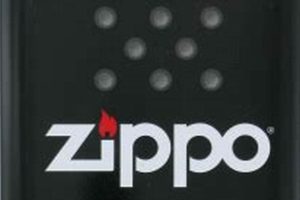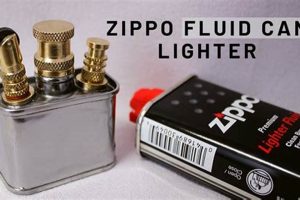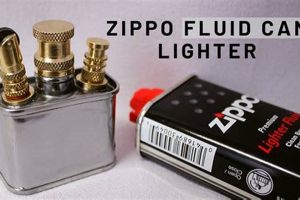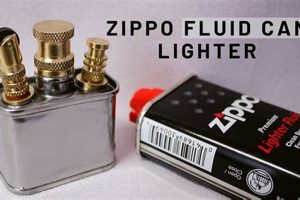While Zippo lighters are renowned for their reliability, their optimal performance hinges on using the correct fuel. Employing a fuel other than premium lighter fluid specifically designed for these lighters can lead to a range of issues. Inferior fuels may contain impurities that clog the wick, hinder proper ignition, or produce an undesirable odor. Using such fuels can also void the lighter’s lifetime guarantee.
Premium lighter fluid is refined to burn cleanly and consistently, preserving the longevity of the wick and internal mechanisms. This specialized fluid is formulated to minimize clogging and ensure reliable ignition in various weather conditions. Adhering to the manufacturer’s recommendation of using premium lighter fluid directly contributes to the lighter’s extended lifespan and consistent performance, characteristics that have solidified Zippo’s reputation for reliability since its inception in the 1930s.
This article will further explore the intricacies of lighter fluid selection, delve into the potential consequences of using inappropriate fuels, and provide practical guidance on proper lighter maintenance to ensure optimal performance.
Tips for Fueling a Zippo Lighter
Maintaining a Zippo lighter’s functionality and longevity depends significantly on proper fueling practices. The following tips provide guidance on selecting and using the correct fuel.
Tip 1: Utilize Premium Lighter Fluid: Opt for premium lighter fluid specifically designed for Zippo lighters. This specialized fluid is formulated to burn cleanly and consistently, minimizing residue buildup.
Tip 2: Avoid Generic or Substitute Fuels: Refrain from using generic lighter fluids, gasoline, or other flammable liquids not explicitly intended for Zippo lighters. These can damage the wick, produce excessive soot, and void the warranty.
Tip 3: Fill Correctly: Open the lighter casing and lift the felt pad to expose the packing material. Saturate the packing material with lighter fluid, avoiding overfilling. Allow excess fluid to absorb before closing the case.
Tip 4: Wipe Away Excess Fluid: After filling, ensure any excess fluid is wiped away from the lighter’s exterior to prevent accidental ignition or staining.
Tip 5: Store Safely: Store lighter fluid in a cool, dry place away from open flames and out of reach of children. Never leave a filled lighter exposed to direct sunlight or high temperatures for extended periods.
Tip 6: Observe Lighter Performance: Monitor the lighter’s performance after filling. If issues such as difficulty igniting or excessive soot occur, consider re-filling with premium lighter fluid after cleaning the lighter.
Adherence to these fuel selection and handling practices ensures optimal lighter performance, extends the lighter’s lifespan, and safeguards against potential hazards.
By understanding the importance of proper fueling and incorporating these tips into regular maintenance routines, users can maximize the reliability and longevity of their Zippo lighters.
1. Zippo Premium Lighter Fluid
The question “can you use any lighter fluid in a Zippo?” directly relates to the importance of Zippo premium lighter fluid. While various flammable liquids exist, Zippo’s performance and longevity depend significantly on using the correct fuel. This section explores the critical connection between using premium fluid and optimal lighter function.
- Fuel Purity and Consistency
Zippo premium lighter fluid is refined to a high degree of purity, ensuring consistent burning and minimizing residue. This purity is crucial for preventing wick clogging, a common issue with lower-quality fuels. Impurities can obstruct fuel flow, leading to inconsistent ignition and reduced flame height.
- Optimized Chemical Composition
The specific chemical composition of Zippo premium fluid is engineered for optimal performance in Zippo lighters. This formulation considers factors such as evaporation rate and combustion characteristics, ensuring reliable ignition and a clean, steady flame. Using fuels with different compositions can lead to issues like excessive soot, unpleasant odors, and even damage to the lighter’s internal components.
- Warranty Considerations
Zippo offers a lifetime guarantee on their lighters, contingent on using appropriate fuel. Utilizing non-recommended fuels can void this warranty, leaving the user responsible for repair or replacement costs. This reinforces the manufacturer’s emphasis on using premium fluid to maintain the lighter’s intended functionality and longevity.
- Long-Term Performance
Consistent use of Zippo premium lighter fluid contributes to the long-term performance and reliability of the lighter. By minimizing wear and tear on internal components, premium fluid helps preserve the lighter’s functionality over time. Using inappropriate fuels can accelerate the degradation of these components, requiring more frequent cleaning or even replacement.
Ultimately, while various flammable liquids might ignite a Zippo, only Zippo premium lighter fluid ensures optimal performance, upholds the lifetime warranty, and contributes to the lighter’s overall lifespan. Choosing the correct fuel is a small but crucial step in preserving the reliability and functionality expected from a Zippo lighter.
2. Avoid Generic Lighter Fluids
The seemingly simple question “can you use any lighter fluid in a Zippo?” underscores a critical maintenance aspect: avoiding generic lighter fluids. While the temptation to use readily available and often cheaper generic options exists, the potential consequences for a Zippo lighter can be significant. This stems from the fundamental difference in composition between premium and generic lighter fluids.
Generic lighter fluids often contain impurities and additives not present in Zippo premium fluid. These impurities can negatively impact lighter performance in several ways. One common issue is wick clogging. Residue from these impurities can accumulate on the wick, restricting fuel flow and hindering ignition. This leads to a weaker flame, inconsistent performance, and the need for more frequent cleaning. Another concern is the production of excessive soot. Generic fluids may not burn as cleanly, resulting in a build-up of soot on the lighter’s internal components, affecting its mechanics and potentially leading to malfunctions. For instance, a user opting for a generic fluid to save a small amount might find themselves needing to replace the wick or other internal parts more frequently, ultimately negating any initial cost savings. Furthermore, the use of generic fluids can produce an unpleasant odor during combustion, diminishing the user experience.
The incompatibility of generic lighter fluids with Zippo lighters extends beyond mere performance issues. Using such fluids can void the lighter’s lifetime guarantee. Zippo explicitly recommends using their premium fluid to maintain the lighter’s functionality and ensure its longevity. Opting for generic alternatives effectively disregards this recommendation and places the onus of repair and maintenance solely on the user. Therefore, understanding the implications of using generic fluids becomes paramount. It directly answers the initial question: no, one cannot use just any lighter fluid in a Zippo if optimal performance and warranty coverage are desired. Choosing the correct fuel becomes a crucial factor in preserving the lighter’s intended function and ensuring its long-term reliability.
3. No Gasoline or Kerosene
The explicit prohibition against using gasoline or kerosene in Zippo lighters directly addresses the core question of permissible fuels. While both substances are flammable, their properties render them unsuitable and potentially damaging to these lighters. This incompatibility stems from several key factors. Gasoline and kerosene possess significantly different burning characteristics compared to Zippo premium lighter fluid. They burn hotter and produce more soot, which can quickly clog the wick and internal mechanisms. This leads to diminished performance, unreliable ignition, and a shortened lifespan for the lighter. Furthermore, the volatile nature of these fuels poses a safety hazard. Their lower flash points increase the risk of accidental ignition and uncontrolled flames. For example, attempting to refill a hot lighter with gasoline could lead to dangerous flare-ups. One real-world consequence of using these unsuitable fuels is the voiding of the Zippo lifetime warranty. The manufacturer explicitly states that using anything other than premium lighter fluid invalidates the warranty, leaving the user responsible for any repairs. This underscores the importance of adhering to the recommended fuel guidelines.
The practical implications of using gasoline or kerosene extend beyond performance and warranty issues. These fuels emit stronger and more unpleasant odors during combustion. The smell can linger on the lighter and hands, making the experience less enjoyable. Moreover, the residue left behind by these fuels can be difficult to clean and may permanently stain the lighter’s casing. Consider a user who fills their Zippo with gasoline while camping. The resulting sooty flame not only reduces the lighter’s effectiveness but also leaves a noticeable residue on the hands and surrounding equipment. This illustrates the practical inconveniences associated with using improper fuels.
In summary, the restriction against gasoline and kerosene highlights the importance of using the correct fuel in a Zippo lighter. While seemingly interchangeable due to their flammability, these fuels possess inherent characteristics that negatively impact lighter performance, safety, and longevity. Understanding this distinction is crucial for preserving the lighter’s functionality, maintaining warranty coverage, and ensuring a safe and enjoyable user experience. The seemingly simple question of permissible fuels ultimately underscores a critical aspect of Zippo lighter maintenance and responsible usage.
4. Risk of Damage and Malfunction
The seemingly straightforward question “can you use any lighter fluid in a Zippo?” belies a significant risk of damage and malfunction if improper fuels are used. A Zippo lighter, while robust, relies on specific fuel characteristics for optimal operation. Using inappropriate fuels can compromise various components and lead to a range of performance issues, impacting the lighter’s longevity and reliability.
- Clogged Wick
The wick, a crucial component for fuel delivery, is particularly susceptible to damage from improper fuels. Generic lighter fluids, gasoline, or kerosene often contain impurities that can clog the wick, restricting fuel flow to the flame. This results in a weak, inconsistent flame or even complete failure to ignite. For instance, a camper using gasoline in their Zippo might find it unreliable in crucial moments, highlighting the practical implications of a clogged wick.
- Damaged Flint Wheel
The flint wheel mechanism, responsible for creating the spark that ignites the fuel, can also be affected by improper fuels. The residue from these fuels can gum up the mechanism, hindering its smooth operation. This can lead to difficulty in generating a spark, requiring excessive force or rendering the lighter unusable. A user might experience increasing difficulty in igniting their lighter over time, eventually needing repairs or replacement.
- Residue Buildup
Inappropriate fuels often leave behind a significant residue within the lighter casing. This buildup can affect the movement of internal parts, leading to malfunctions in the opening and closing mechanism or impacting the fuel release system. Over time, this can render the lighter difficult to use or even permanently damage its functionality. A lighter consistently filled with gasoline, for example, might develop a sticky residue, making it challenging to open and close smoothly.
- Compromised Fuel Reservoir
The fuel reservoir, typically made of felt, can be degraded by certain fuels. Gasoline, for instance, can break down the felt fibers, reducing its ability to effectively hold and dispense fuel. This can lead to leaks, reduced fuel capacity, and inconsistent flame height. A lighter with a compromised reservoir might require frequent refilling, diminishing its practicality.
These potential risks underscore the importance of using only Zippo premium lighter fluid. The choice of fuel directly impacts the lighter’s performance, longevity, and overall reliability. Opting for improper fuels, while seemingly a minor decision, can lead to significant damage, ultimately undermining the functionality and lifespan of the Zippo lighter.
5. Voiding the Warranty
The question of permissible lighter fluids for a Zippo directly impacts its warranty. Zippo’s lifetime guarantee, a cornerstone of its brand reputation, hinges on proper usage, including the exclusive use of Zippo premium lighter fluid. This stipulation underscores the critical link between fuel choice and warranty validity. Using any other fuel, including generic lighter fluids, gasoline, or kerosene, constitutes a breach of warranty terms and renders the guarantee null and void. This has significant practical implications for lighter owners. Should a malfunction arise due to the use of an inappropriate fuel, the owner bears full responsibility for repair or replacement costs. For example, if a user experiencing ignition issues due to a clogged wick (caused by using generic fluid) submits the lighter for repair under warranty, Zippo may refuse service, citing improper fuel usage. The user then faces the cost of repair or replacement, potentially exceeding the initial cost savings from using a cheaper, generic fuel.
The rationale behind this warranty stipulation lies in the detrimental effects of improper fuels on the lighter’s mechanism. As previously discussed, generic lighter fluids, gasoline, and kerosene can leave residue, clog the wick, and damage internal components. These issues, directly attributable to fuel choice, fall outside the scope of the warranty, which covers manufacturing defects, not damage caused by misuse. Consider a scenario where a user consistently fills their Zippo with gasoline, leading to a damaged fuel reservoir. While the reservoir itself might have been free of manufacturing defects initially, the damage caused by the gasoline negates any warranty coverage. The user bears the cost of repair, effectively highlighting the long-term cost implications of using improper fuels.
Understanding the connection between fuel selection and warranty coverage is crucial for responsible Zippo ownership. The lifetime guarantee, a significant value proposition, remains contingent on adhering to usage guidelines, including the exclusive use of Zippo premium lighter fluid. Choosing the correct fuel safeguards not only the lighter’s performance but also the owner’s investment, ensuring long-term reliability and avoiding unexpected repair or replacement costs. Ultimately, the seemingly simple question of fuel choice carries significant weight, impacting both the practical functionality of the lighter and the validity of its lifetime guarantee.
Frequently Asked Questions
This section addresses common inquiries regarding the use of lighter fluids in Zippo lighters, providing concise and informative responses.
Question 1: What happens if lighter fluid other than Zippo premium fluid is used?
Using non-recommended fluids can lead to wick clogging, reduced flame height, inconsistent ignition, unpleasant odors, and potential damage to internal components. It also voids the Zippo lifetime warranty.
Question 2: Can gasoline be used in a Zippo lighter in emergencies?
While gasoline might ignite, its use is strongly discouraged. It poses safety risks due to higher volatility, produces excessive soot, and can severely damage the lighter’s internal mechanisms. It will also void the warranty.
Question 3: Are generic lighter fluids a suitable alternative to Zippo premium fluid?
Generic fluids are not recommended. They may contain impurities that clog the wick and hinder performance. Using them risks damage and voids the warranty.
Question 4: Does using the correct lighter fluid truly extend a Zippo’s lifespan?
Yes. Zippo premium lighter fluid’s refined composition minimizes residue and wear on internal parts, contributing significantly to the lighter’s longevity.
Question 5: What should be done if non-recommended fluid has already been used in a Zippo?
It’s advisable to drain any remaining non-recommended fluid, clean the lighter thoroughly, and refill it with Zippo premium fluid. However, any prior damage caused may not be reversible.
Question 6: Where can authentic Zippo premium lighter fluid be purchased?
Authentic Zippo premium lighter fluid can be purchased from authorized retailers, including tobacco shops, convenience stores, and online marketplaces.
Maintaining a Zippo lighter’s optimal functionality requires using the correct fuel. Adhering to manufacturer recommendations ensures long-term reliability and preserves the lifetime warranty.
The following section will offer detailed instructions on proper Zippo lighter maintenance, covering cleaning, flint replacement, and wick care.
Can You Use Any Lighter Fluid in a Zippo? A Definitive Answer.
This exploration definitively answers the question of permissible lighter fluids for Zippo lighters. While various flammable liquids exist, optimal performance, longevity, and warranty preservation necessitate using Zippo premium lighter fluid exclusively. Generic lighter fluids, gasoline, and kerosene, despite their flammability, pose significant risks. These include wick clogging, internal mechanism damage, compromised fuel reservoirs, and ultimately, lighter malfunction. Such risks not only degrade performance but also void the lifetime warranty, a key feature of Zippo ownership. The rationale for using premium fluid stems from its refined composition, minimizing residue and ensuring compatibility with the lighter’s intricate design.
Maintaining a Zippo lighter’s functionality and preserving its iconic status requires informed fuel selection. Choosing the correct fuel is a small yet critical investment in the lighter’s long-term reliability and user experience. By adhering to manufacturer recommendations, users safeguard their investment and contribute to the enduring legacy of this classic lighter. Disregarding these guidelines, however seemingly insignificant, risks jeopardizing the lighter’s performance and negates the value of the lifetime guarantee. Ultimately, responsible ownership and informed decision-making ensure the Zippo lighter continues to deliver its intended functionality for generations to come.







